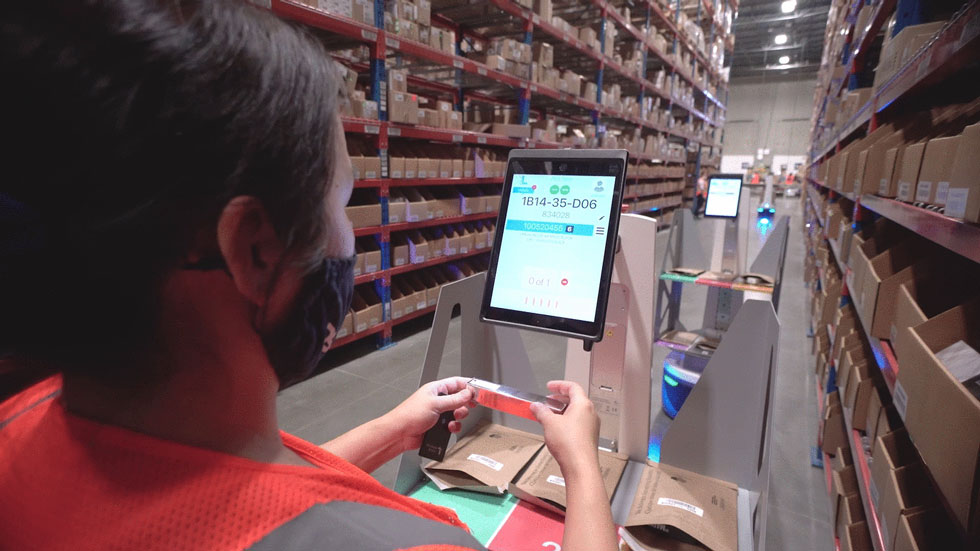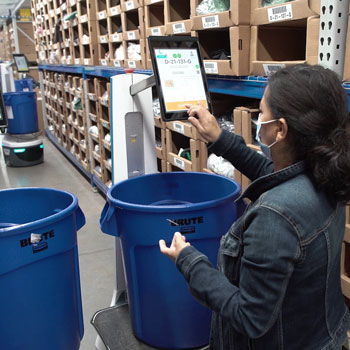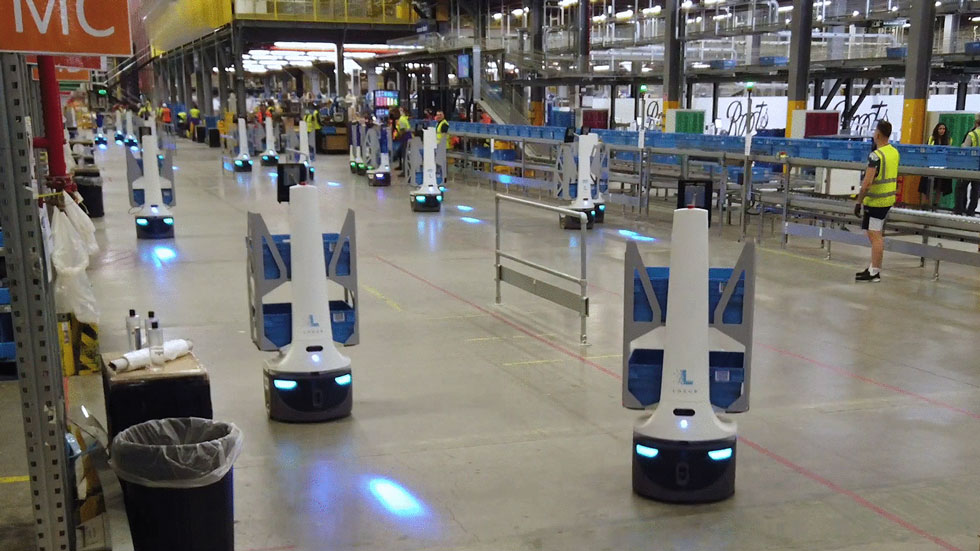One of the most dangerous places for warehouse workers is the distribution yard between containers and trucks. Now, through a minority investment in Outrider, a company that makes autonomous electric vehicles, Prologis Ventures, a venture capital arm of Prologis, Inc. (NYSE: PLD), is helping to address that safety issue, while also improving sustainability and efficiency measures.
“Outrider’s self-driving technology integrates with electric yard trucks, so they remove the emissions from the warehouse yard and are completely digitized for safe operations,” says Will O’Donnell, founder and managing director of Prologis Ventures. “The trucks automatically connect to the tractors and trailers in the yard, so you don’t have people dodging the trucks, or slowdowns while a bunch of trucks try to maneuver around each other.”
Due to commercial ships languishing in the Suez Canal and the Chesapeake Bay, a backlog of containers stuck in California ports, and a massive shortage of truck drivers and warehouse workers, supply chain bottlenecks have been top of mind for nearly every industry for the past two years. Prologis Ventures has invested in companies like Outrider, and others, to address supply chain issues and other pain points experienced by their customers—and to leverage the scale of Prologis to find solutions.
Driving Change
Prologis Ventures was launched six years ago to drive change and to put Prologis at the forefront of innovation, O’Donnell says. “Historically, real estate has not been about innovation but as e-commerce began changing location and space needs, we realized we had massive amounts of data and insights that could be valuable to us and our customers.”
Today, Prologis Ventures is a minority investor in 37 start-up companies. In addition, the REIT is incubating some innovative businesses in-house in the areas of sustainability and electric vehicle charging infrastructure.
“Typically, real estate involves a three-month negotiation and then little interaction between the owners and the tenants for five years,” O’Donnell says. “We are focused on our customers’ needs and providing them solutions throughout our relationship to help them be more successful.“
“Sometimes we invest in a third-party company and their business aligns with our capabilities and customer pain points,” in which case it often becomes part of Prologis’ Essentials warehouse solutions arm and creates new revenue streams, O’Donnell says. “We work with top vendors and services to integrate solutions more quickly for our customers. Our goal is to do what’s best for our customers everywhere, not just at Prologis facilities.”
The partnerships between Prologis, its customers, and third-party businesses focus on warehouse operations, workforce solutions, energy solutions, transportation, and digitization.
Turnkey Solutions
Setting up a warehouse with the appropriate technology and infrastructure can be complex, so Prologis Ventures invests in and partners with best-in-class companies and technology to smooth the way for their customers.
“We understand our customers’ needs, so we provide them everything from IT services to the racking and the forklifts they need so they can focus on operations instead of on setting up their warehouse,” O’Donnell says. “With our size and scale, we can develop relationships with companies that provide innovative solutions that solve the pain points our customers feel.”
For example, Prologis Ventures invests in SVT Robotics, whose Softbot software platform eases the transition to use robotics or other automation quickly and efficiently, without the need to write customized code.
“SVT Robotics allows seamless integration between different warehouse management systems and automation solutions, solving a barrier for adoption,” O’Donnell notes.
Leveraging Data
As the owner of one billion square feet of industrial space around the globe, Prologis has vast resources of data that can be used to inform not only their company’s decisions but also other companies. Prologis Ventures’ investments include some proptech businesses such as Archipelago, which digitizes the insurance process for easier underwriting.
O’Donnell says Prologis Ventures was one of Archipelago’s first customers and investors because it could see the benefits of removing inefficiencies in underwriting insurance premiums. “For example, with Archipelago we are able to aggregate critical property information and characteristics that allow Prologis to capture, measure, and streamline decisions to quantify risk and allows our Insurers to have a digital and enhanced view of our portfolio.”
Data.world, another company Prologis Ventures has invested in, is a data catalog tool that allows individuals across the organization to access and analyze data.
“There’s value in the insights we have because 2.5% of the world’s GDP flows through our warehouses,” O’Donnell says. “We can leverage our platform to see the challenges in the supply chain and then overlay technology on our physical assets to make improvements.”
Transportation Innovations
While Prologis itself is committed to sustainability, its customers are also looking for ways to reduce their carbon footprint.
One area of complexity is adapting to a fleet of electric vehicles, according to O’Donnell. “We are partnering with key stakeholders such as utilities to provide the supporting infrastructure to accommodate EV charging stations.”
While warehouse consumption of electricity is relatively low compared to some other asset classes, as EVs and warehouse autonomation are increasingly part of industrial sites the need for electricity will grow.
“We’re getting ahead of those needs now with visibility into various approaches to this issue and to drive parties to the discussion,” O’Donnell says. “For example, we know that EV manufacturers need the infrastructure in place to accelerate vehicles sales. But we’re in the very beginning innings of the transition to EVs for truck fleets.
Meanwhile, O’Donnell says customers want visibility across the supply chain, including ships, trucks, and warehouses so they can make predictive decisions. One company Prologis Ventures invests in, Wise Systems, provides insight into last-mile delivery solutions.
“We’ve focused on building our portfolio tied to consumption, so we have more urban infill locations than we used to,” O’Donnell says. Consumers expect same day or next day delivery and Prologis’ customers need to meet that demand, he adds.
Wise Systems optimizes last-mile delivery with datadriven insight and tracking information on the best routes and provides drivers with the ability to add information in an app about issues that can speed or slow deliveries, such as parking options and even the number of stairs to climb to drop off a package in real time.
Another Prologis Ventures investment, Airspace, provides instant access to the fastest ground and air shipment options with a software solution that analyzes the details of the shipment, availability of drivers and flights, and optimal routes.
Workforce Improvements
Keeping workers content and healthy is not only the right thing for companies to do, but also a financially savvy move to reduce workforce injuries while maintaining high levels of productivity. Another of Prologis Ventures’ investments is in Kinetic, a company that produces wearable devices connected to a software analytics platform to reduce injuries.
Workers get a vibration if they’re moving in a way that could lead to an injury, O’Donnell says. The system also collects data so that the company may be able to make improvements in their operations to reduce injuries.
Prologis Ventures has also invested in Locus Robotics, which provides both efficiency and safety benefits. Warehouse workers often walk six or seven miles a day picking up items and packing them, O’Donnell points out. Locus Robotics has developed robots that can be quickly integrated into the warehouse to allow workers to stay in one place while the robot brings items to them. It’s safer and less strenuous for the workers, and quicker, he says.
Other companies that Prologis Ventures has invested in include WorkStep, which has software that helps companies hire and retain frontline workers. “We’re investing in companies that offer innovations in recruiting, retaining, and training employees, and that increase safety,” O’Donnell says.
Prologis Ventures also invests in Strivr, a company that produces scientifically-based virtual reality workforce training that can help companies improve productivity and retain their employees.
The financial investments Prologis Ventures makes, along with the introductions between startups and their potential customers, are already beginning to drive change and to impact efficiency, cost savings, worker safety, and environmental improvements. In its own words, Prologis Ventures is building the future of commerce—whatever direction that may take in the years ahead.


